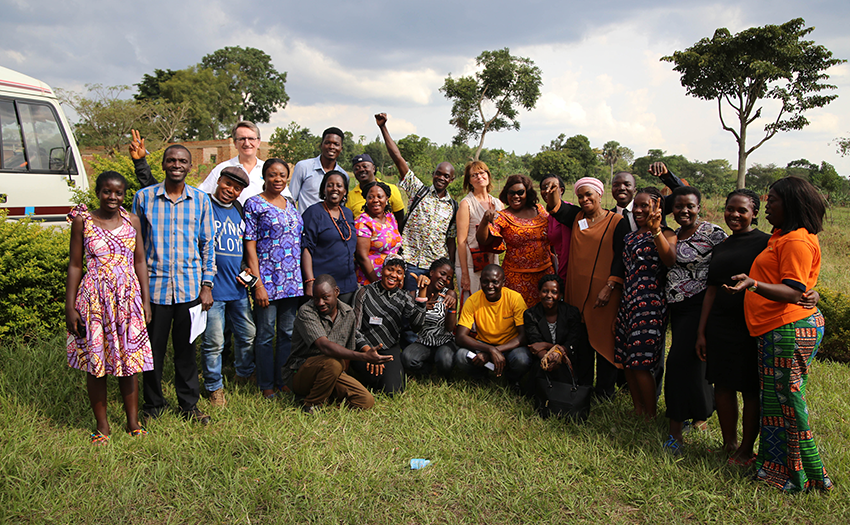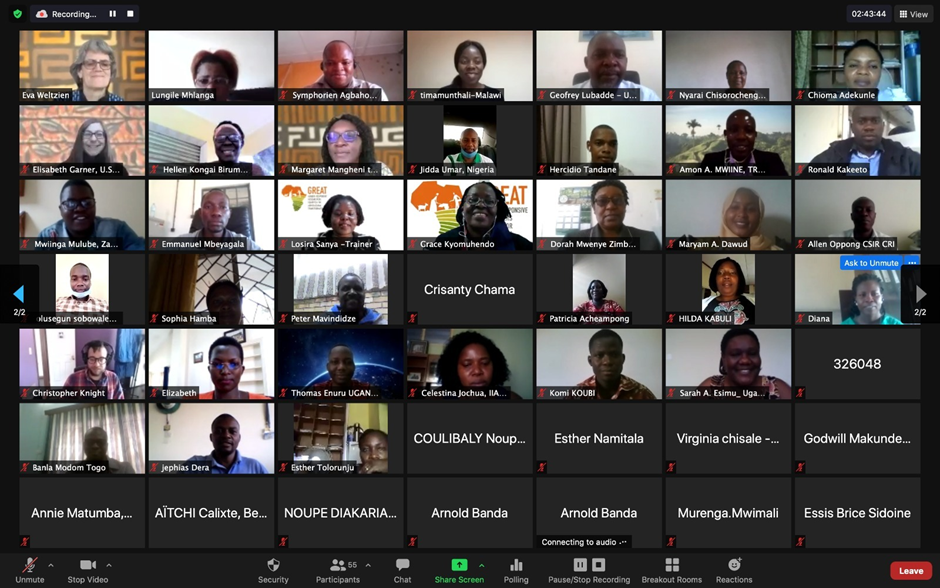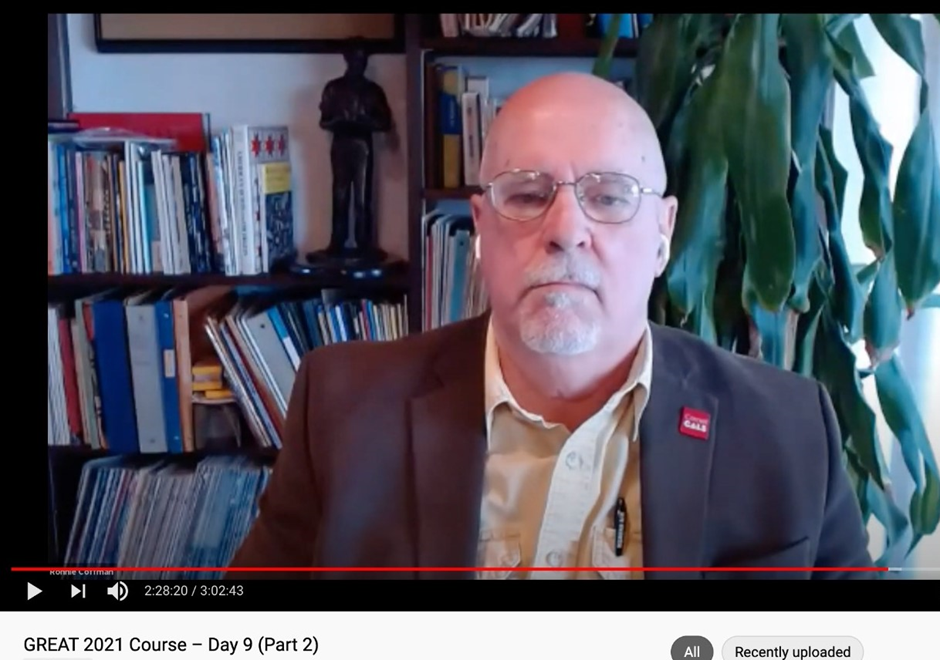
Following a two-week training session dubbed “GREAT Theme 5 course,” more than 50 researchers from more than ten Sub-Saharan African countries were equipped with gender responsive knowledge to enable them to integrate gender into their crop breeding programs. The training, which took place from March 8th to March 22nd, 2021, was organized by Makerere University’s College of Agricultural and Environmental Sciences (CAES) in collaboration with Cornell University under the project titled Gender-responsive Researchers Equipped for Agricultural Transformation (GREAT).
 A section of participants and trainers during the Theme 5 course
A section of participants and trainers during the Theme 5 course
Researchers were introduced to gender concepts, the relevance of gender to agriculture and plant breeding programs in sub-Saharan Africa, key concepts pertinent to market and gender-responsive plant breeding, gendered qualitative and quantitative data collection methods, gender responsive qualitative and quantitative data analysis. They were also taught about important factors to consider when conducting interdisciplinary research and how to apply gender to ongoing plant breeding projects.
Researchers learned how to identify the needs of men and women when setting priorities, implementing breeding projects, measuring and communicating project outcomes through various training sessions led by over 15 experts in gender and agriculture from CAES, the School of Women and Gender Studies (SWGS), Cornell University, and international experts. As scientists and agricultural development professionals, participants gained a broader and deeper understanding of the role of gender in their research projects.
The GREAT courses:
The GREAT Theme 5 course is the 5th and the last of the five mainstream gender-responsive agricultural research courses held in the five-year project period which started in 2016. The first course (theme 1) was conducted in September 2016/2017 and this focused on Gender-Responsive Root, Tuber and Banana Breeding; theme 2 course focused on gender-responsive cereal breeding in 2017/2018; theme 3 focused on gender-responsive Legume breeding in August 2018; while theme 4 targeted researchers working on all crops ad was held in July 2019 and completed in 2020. The fifth cohort concentrated on engendering plant breeding research programs, specifically addressing the roles and needs of men and women while highlighting pressing challenges in Sub-Saharan Africa. The participants’ research projects included:
- Participatory selection of cowpea varieties for yield and resistance to the major biotic and abiotic stress in central Benin, Benin
- Wheat Breeding program, Zimbabwe
- African Agriculture Transformation
- Peanut breeding in Togo, Togo
- Improving bean productivity and markets in Zambia, Zambia
- Small grain breeding and promotion, Zimbabwe
- African Agriculture Transformation, Malawi
The course was divided into two parts. Part one of the training held from March 8th – 16th, 2021 focused on the self-realization and conceptual clarity (understanding personal internalized stereotypes and views of the world around gender particularly in agriculture), gender responsive plant breeding case studies, methodology: qualitative and quantitative interdisciplinary research principles for social sciences to be able to do the design phases, research questions, case studies, and team presentations. The second part, which took place from March 18th to March 22nd, 2021, focused on the science of gender research design, qualitative gender data analysis, mixed methods gender research design, integration and writing, and community of practice.
Graduation Ceremony:
On March 22, 2021, the GREAT project celebrated the graduation of more than 50 Biophysical and Social Scientist researchers. These participants join the 272 researchers/alumni who have been trained to do GREAT, 89 percent of whom are social scientists, 57 percent of whom are biophysical scientists, and 43 percent of whom are women. This was the first cohort to graduate after 9 days of intense virtual training with a GREAT Roadmap that had been carefully designed, researched, and reviewed.
Participants received certificates of completion from Makerere University and Cornell University for the Gender Responsive Plant Breeding course Graduates came from more than Sub-Saharan African countries, including Uganda, Kenya, Zambia, Zimbabwe, Mozambique, Eswatini, Ivory Coast, Benin, Mali, Ghana, and Nigeria.
The virtual graduation ceremony was graced by Prof. Ronnie Coffman the Director of International Programmes at the College of Agriculture and Life Sciences, Cornell University; Prof. Margaret Najjingo Mangheni, GREAT Project PI Makerere University; Dr. Hale Tufan, GREAT Project PI Cornell university; GREAT Trainers, Prof. Grace Bantebya Kyomuhendo, SWGS; Dr. Peace Musiimenta, SWGS; Dr. Brenda Boonabaana, CAES; Dr. Hale Tufan, Cornell university; Dr. Elisabeth Garner, Cornell university, Dr. Christine Leuenberger, Cornell University; as well as the GREAT organizers Mr. Devon Jenkins, Cornell university; Ms. Elizabeth Asiimwe, CAES; and the GREAT Trainees 2021.

Prof. Ronnie Coffman during the closing ceremony of the GREAT Theme 5 Virtual Course
In his remarks, Prof. Ronnie Coffman thanked trainees for taking part in the GREAT theme 5 course and congratulated them on their achievements, particularly during the difficult COVID 19 times, noting that they are now part of a new wave of African scientists who will develop agricultural technology in Africa and for Africans. He hoped that the knowledge they had gathered would be integrated in their breeding programs.
“Thank you for being a part of the great vision, which I’m sure you’ve learnt this week, of empowering researchers to become more inclusive and effective agricultural systems by addressing the priorities of women and men in Sub-Saharan Africa. My graduation advice is to not be afraid to take risks. In life, you do not regret the things you did, but rather the things you did not do. So keep that in mind as you look to the future. Thank you once more for being a part of this training and joining the great vision.” remarked Prof. Coffman.
During the ceremony, three outstanding researchers from three categories were recognized for their exceptional performance during the GREAT course. The categories were: Social Sciences, Teams, and Biophysical Science. Emmanuel Mbeyagala from Uganda’s National Agricultural Research Organization (NARO), stood out in the Biophysical Sciences category, Freeman Gutsa from Zimbabwe was recognized in the Social Scientists category, while Freeman Gutsa and Peter Mavindidze from Zimbabwe stood out in the Teams category.
On behalf of the recognized researchers and all trainees, Emmanuel Mbeyagala expressed gratitude to the GREAT course organizers for the opportunity to participate in the GREAT course saying, they had learned a lot and were looking forward to incorporating what they had learned into their research programs and networking.
Follow course highlights on our social media platforms using the hashtag #GREATGenderAg
About the authors
For press inquiries or for more information, email us at great@cornell.edu.





